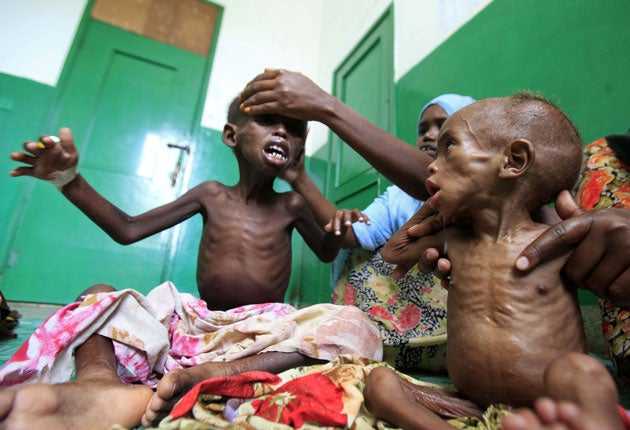Somalia: Food situation worsens in the north, where camp numbers are swelling

With the world's press focused on the unfolding humanitarian disaster in the embattled capital, Mogadishu, the rest of the country has slipped from the media radar. This is understandable, but nevertheless a mistake.
Across vast swathes of the north, the UN already describes the food security situation as an "emergency". This is one grade above a "crisis", and just one below a full-blown, class-five famine – which, as the UN announced last week, is now advancing northwards.
Qardho, a nomad market town of 82,000 in the centre of the semi-autonomous Puntland region, is in a mere "crisis" area. This makes it a haven for fleeing southerners, some 22,000 of whom are now in nine makeshift camps on the edge of town. The sanctuary on offer at Qardho is only relative. "Everyone is talking about the south," said Ugbed, a clan elder at Shabelle camp, the largest at Qardho. "I know things are worse there, and that we are lucky to be here. But please don't forget us. We need help too. "
Their stories are the same as everywhere else. Their cattle all died; fighters for Al-Shabaab, the southern-based Islamist insurgency, tried to stop them leaving to find food; their children died on the road, or are dying now, of measles, of malaria, of diarrhoea – as well as starvation.
The rains that fell here in May came only just in time. "Eighty per cent of our livestock died before May," said Mahamoud Mohamed Shire, a town council official. "Those remaining are in poor shape."
Some camp residents have been here for four years. Famine did not descend overnight on Somalia but has been building for many seasons. Drought, as every nomad knows, is cyclical. Its effects are best mitigated by long-term development projects.
This kind of work remains chronically underfunded. The UN is building a new prison in Qardho. It will be an excellent place to lock up the pirates who plague the coast of Puntland. The prison cost $1m to build – a snip compared with the $8bn-$12bn that the piracy problem is estimated to cost the world economy each year.
The prison will be serviced by a new well, which is already in operation. There are no queues today at the Qardho wellhead. This is a good sign: the well is surplus to requirements for now. It cost a lot to sink, but as insurance against an uncertain and possibly calamitous future, it is surely beyond price.
Join our commenting forum
Join thought-provoking conversations, follow other Independent readers and see their replies
Comments